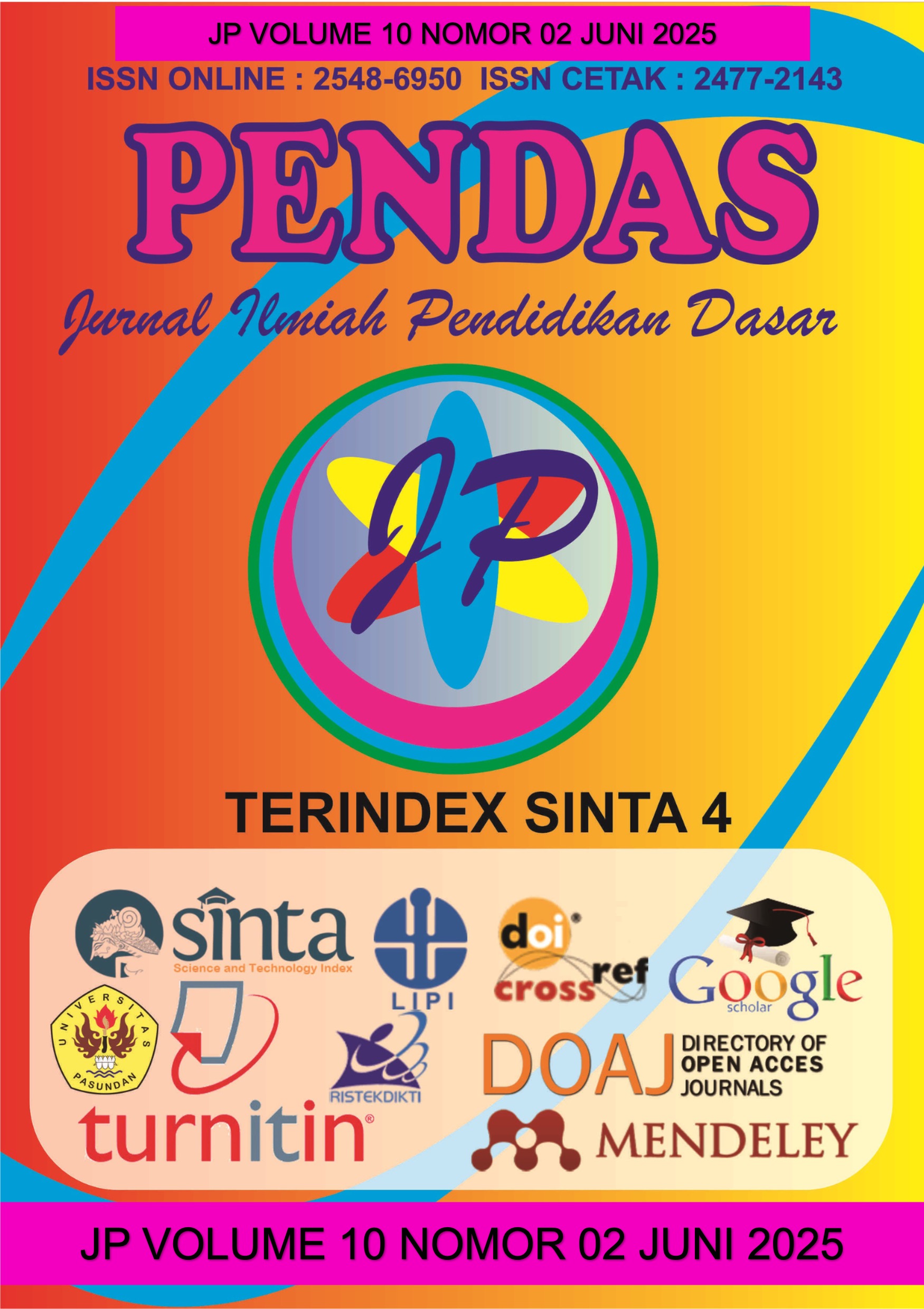EFEKTIVITAS GAME-BASED LEARNING DENGAN GIGA RUN TERHADAP HASIL BELAJAR DAN KETERLIBATAN SISWA SMK TEKNIK PAL SURABAYA PADA MATA PELAJARAN INFORMATIKA
DOI:
https://doi.org/10.23969/jp.v10i02.24696Keywords:
Smartphone, Game Based Learning, Hasil Belajar, Keterlibatan SiswaAbstract
Smartphone kini menjadi kebutuhan esensial yang dimiliki oleh berbagai lapisan masyarakat dan berpotensi mendukung proses pembelajaran. Namun, penggunaan smartphone yang tidak tepat, seperti untuk aktivitas non-akademik selama pembelajaran berlangsung berdampak negatif terhadap hasil belajar dan keterlibatan siswa. penelitian ini bertujuan untuk mengkaji efektivitas penerapan Game-based learning (GBL) melalui media game edukasi berbasis Android bernama Giga Run dalam memanfaatkan smartphone untuk meningkatkan hasil belajar dan keterlibatan siswa pada mata pelajaran Informatika di SMK Teknik PAL Surabaya. Desain penelitian ini menggunakan kuasi-eksperimen, yang melibatkan 40 siswa yang dibagi dalam kelompok eksperimen dan kontrol. Kelompok eksperimen menggunakan GBL dalam pembelajaran, sementara kelompok kontrol menggunakan metode konvensional. Data dikumpulkan melalui pretest dan posttest untuk mengukur hasil belajar, serta kuesioner Likert untuk mengukur keterlibatan siswa. Hasil penelitian menunjukkan bahwa GBL melalui Giga Run cukup efektif meningkatkan hasil belajar siswa serta menghasilkan tingkat keterlibatan belajar yang lebih tinggi dibandingkan dengan metode pembelajaran konvensional.
Downloads
References
Anshari, M., Almunawar, M. N., Shahrill, M., Wicaksono, D. K., & Huda, M. (2017). Smartphones usage in the classrooms: Learning aid or interference? Education and Information Technologies, 22(6), 3063–3079.
Asniar, Dilfa, Ismail, L., Nasir, & Sahirah, S. (2024). PENGARUH MEDIA PEMBELAJARAN WORDWALL BERBASIS GAME BASED LEARNING TERHADAP HASIL BELAJAR SISWA PADA MATA PELAJARAN INFORMATIKA. Didaktik : Jurnal Ilmiah PGSD STKIP Subang, 10(04), 280–287.
Chen, S., Guan, J., & Jiang, H. (2022). Exploring the Influence of Problematic Mobile Phone Use on Mathematics Anxiety and Mathematics Self-Efficacy: An Empirical Study during the COVID-19 Pandemic. Sustainability, 14(15), 9032.
Gath, M. E., Monk, L., Scott, A., & Gillon, G. T. (2024). Smartphones at School: A Mixed-Methods Analysis of Educators’ and Students’ Perspectives on Mobile Phone Use at School. Education Sciences, 14(4).
Jin, C., Niu, J., & Fan, C. (2024). How physical exercise influences academic burnout among Chinese “Double Non” college students: the chain mediation role of mobile phone addiction and learning engagement. Frontiers in Psychology, 14.
Manzano-León, A., Aguilar-Parra, J. M., Salavera, C., & Rodríguez-Ferrer, J. M. (2022). The Legends of Elendor: Educational Gamification as an Influential Factor in Academic Flow and Academic Performance in Socially Depressed Communities. Education Sciences, 13(1), 8.
Monalisa, M. (2023). PENGARUH GAME BASED LEARNING MATA PELAJARAN INFORMATIKA KURIKULUM MERDEKA TERHADAP MOTIVASI DAN PRESTASI BELAJAR. Padma Sari: Jurnal Ilmu Pendidikan, 3(01), 19–29.
Morris, P. (2020). Mobile phones in the classroom: Policies and potential pedagogy. Journal of Media Literacy Education, 12(1), 57–69.
Nadeem, M., Oroszlanyova, M., & Farag, W. (2023). Effect of Digital Game-Based Learning on Student Engagement and Motivation. Computers 2023, Vol. 12, Page 177, 12(9), 177.
Olang’O, J., Amuka, L., Malechwanzi, J., & Murage, S. (2021). Effects of Free Day Secondary Education Policy on Academic Performance of Rural Public Day Secondary Schools in Kilifi County, Kenya. Journal of Learning for Development, 8(1), 192–203.
Plass, J. L., Mayer, R. E., & Homer, B. D. (2020). Handbook of Game-Based Learning. The MIT Press.
Pranata, O. D. (2023). Penerapan Game-based Learning sebagai Alternatif Solusi Mengajar di Kelas Heterogen. Jurnal Pengabdian Al-Ikhlas, 8(3).
Pratiwi, I., Hendrik, H., Atmadiredja, G., & Utama, B. (2019). Konsentrasi Belajar Siswa SMA dan Penggunaan Gawai.
Putri, A. N., Fitri, A. N., Anggreini, N., Sulfiani, Quraissy, A., & Ramliah. (2024). PENGARUH PENGGUNAAN MEDIA PEMBELAJARAN KAHOOT BERBASIS GAME BASED LEARNING TERHADAP HASIL BELAJAR SISWA PADA MATA PELAJARAN INFORMATIKA DI SMK NEGERI 2 MAROS. Jurnal Guru Pencerah Semesta, 3(1), 13–23.
Raharjo, A. D., Putri, A. A., & Budi, H. R. (2024). The use of game-based learning to increase student engagement. Hipkin Journal of Educational Research, 1(3), 299–310.
Slamet, J. (2024). Empowering Slow Learners: Gamification’s Impact on Students’ Engagement and Academic Performance in an LMS for Undergraduate Students. International Journal of Information and Education Technology, 14(2), 193–203.
Smale, W. T., Hutcheson, R., & Russo, C. J. (2021). Cell Phones, Student Rights, and School Safety: Finding the Right Balance. Canadian Journal of Educational Administration and Policy, 195, 49–64.
Sukarelawan, M. I., Indratno, T. K., & Ayu, S. M. (2024). N-Gain vs Stacking.
Suseno, M., Bien, J. K., Hayat, B., Putra, M. D. K., Hartanto, H., & Rachmawati, R. (2022). A differential item functioning (DIF) analysis of the mobile phone problem use scale in Indonesian schools with and without smartphone banned policy. Cogent Psychology, 9(1).
Suyanto, S., Yesicha, C., Nasution, B., Nurjanah, N., Wahidar, T. I., Ismandianto, I., & Ersa, W. (2024). Empowering high school students with online game literacy. Journal of Community Service and Empowerment, 5(1), 130–135.
Whitton, N. (2012). Games-Based Learning BT - Encyclopedia of the Sciences of Learning (N. M. Seel (ed.); hal. 1337–1340). Springer US.
Zhu, Y., Pang, W., & Chen, B. Bin. (2023). The student engagement scale: evidence of psychometric validity in Chinese and English language subjects from grade 4 to grade 6 in China. Educational Psychology, 43(2–3), 173–186.
Downloads
Published
Issue
Section
License
Copyright (c) 2025 Pendas : Jurnal Ilmiah Pendidikan Dasar

This work is licensed under a Creative Commons Attribution 4.0 International License.














































